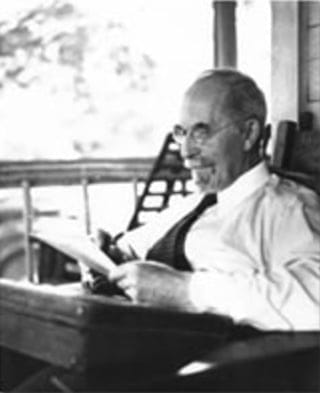Harold W. Percival
As Harold W. Percival pointed out in the Author’s Foreword of Thinking and Destiny, he preferred to keep his authorship in the background. He wanted his writings to stand on their own merit. His intention was that the validity of his statements not be influenced by his personality, but be tested according to the degree of self-knowledge within each reader. Nevertheless, people do want to know something about an author of note, especially if they are involved with his writings.
So, a few facts about Mr. Percival are mentioned here, and more details are available in his Author’s Foreword. Harold Waldwin Percival was born in Bridgetown, Barbados on April 15, 1868, on a plantation owned by his parents. He was the third of four children, none of whom survived him. His parents, Elizabeth Ann Taylor and James Percival were devout Christians; yet much of what he heard as a very young child did not seem reasonable, and there were no satisfactory answers to his many questions. He felt that there must be those who knew, and at a very early age determined that he would find the “Wise Ones” and learn from them. As years passed, his concept of the “Wise Ones” changed, but his purpose to gain Self-knowledge remained.

1868–1953
When he was ten years old, his father died and his mother moved to the United States, settling in Boston, and later in New York City. He looked after his mother for about thirteen years until her death in 1905. Percival became interested in Theosophy and joined the Theosophical Society in 1892. That society split into factions after the death of William Q. Judge in 1896. Mr. Percival later organized the Theosophical Society Independent, which met to study the writings of Madame Blavatsky and Eastern “scriptures.”
In 1893, and twice again during the next fourteen years, Percival became “conscious of Consciousness,” He said that the value of that experience was that it enabled him to know about any subject by a mental process he called real thinking. He stated, “Being conscious of Consciousness reveals the ‘unknown’ to the one who has been so conscious.”
In 1908, and for a number of years, Percival and several friends owned and operated about five hundred acres of orchards, farmland, and a cannery about seventy miles north of New York City. When the property was sold Percival kept about eighty acres. It was there, near Highland, NY, where he resided during the summer months and devoted his time to the continual work on his manuscripts.
In 1912 Percival began to outline material for a book to contain his complete system of thinking. Because his body had to be still while he thought, he dictated whenever assistance was available. In 1932 the first draft was completed and was called The Law of Thought. He did not give opinions or draw conclusions. Rather, he reported that of which he was conscious through steady, focused thinking. The title was changed to Thinking and Destiny, and the book was finally printed in 1946. And so, this one-thousand-page masterpiece that provides crucial details on humankind and our relationship with the cosmos and beyond was produced over a period of thirty-four years. Subsequently, in 1951, he published Man and Woman and Child and, in 1952, Masonry and Its Symbols—In the Light of Thinking and Destiny, and Democracy Is Self-Government.
From 1904 to 1917, Percival published a monthly magazine, The Word, that had a worldwide circulation. Many eminent writers of the day contributed to it, and all the issues contained an article by Percival as well. These editorials were featured in each of 156 issues and earned him a place in Who’s Who in America. The Word Foundation started a second series of The Word in 1986 as a quarterly magazine that is available to its members.
Mr. Percival passed away of natural causes on March 6, 1953 in New York City. His body was cremated according to his wishes. It has been stated that no one could meet Percival without feeling that he or she had met a truly remarkable human being, and his power and authority could be felt. For all his wisdom, he remained genteel and modest, a gentleman of incorruptible honesty, a warm and sympathetic friend. He was always ready to be helpful to any seeker, but never trying to impose his philosophy on anyone. He was an avid reader on diversified subjects and had many interests, including current events, politics, economics, history, photography, horticulture and geology. Besides his talent for writing, Percival had a propensity for mathematics and languages, especially classical Greek and Hebrew; but it was said that he was always prevented from doing anything but that which he was evidently here to do.
Harold W. Percival in his books and other writings reveals the true state, and potential, of the human.
